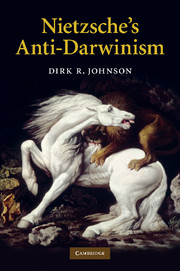Conclusion
Published online by Cambridge University Press: 17 November 2010
Summary
Nietzsche's philosophy in his final years was premised on a fundamental anti-Darwinism. This antagonism did not emerge suddenly; nor was it “wrong” about the fundamentals of Darwinian science. It was the product of years of serious reflection on the philosophical underpinnings of modern science, in particular Darwinism. But how can so many prominent scholars seem to get this issue so wrong? I would like to suggest several possible reasons. The first is that Nietzsche himself did not make his antagonism explicit. Though GM was meant as a polemical response to the Darwinists, it was written in such a way that one could fairly believe that he had composed it in their spirit and that it mirrored their convictions. Rather than see how the text undermined them, the “genealogists” could (and without significant stretch) believe that its methods vindicated them. Their assumption is understandable, particularly since his polemic was one of the first at that time to argue on the principles of “naturalism” and to reject the transcendental bases for morality. If one considers that Darwin's genealogical methods were still being developed, challenged, and contested, his approach was truly radical, and it seemed to take the side of scientific naturalism.
Second, commentators do not recognize the important link between Nietzsche's gradually unfolding middle-period critique of the moralistes, particularly on the basis of their altruism–egoism distinction, and his late-period challenge to the ascetic ideal.
- Type
- Chapter
- Information
- Nietzsche's Anti-Darwinism , pp. 203 - 214Publisher: Cambridge University PressPrint publication year: 2010



